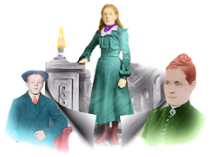


Origination 2.
|
British Place Names. Place names are all around us the majority are a derivative of the Old English, Viking, Celtic and Briton languages, and they are all describing something! Place names on the whole could be used for navigation, we have to understand the ancient travellers had no maps but what they did have was what they could see. So if we look at Barton-le-clay we can strip this down to what it is describing. Bar is a strip of land usually arable, ton can be loosely described as a farm [it can actually just be a small enclosure], le is the, clay is clay [Mud]. So now we have all the elements it tells us that when we get to Barton-le-clay we will see a "small farm on a strip of arable land surrounded by clay" Using the place names we can still navigate quite well but they now mean nothing to the ordinary person in the street. But it is still an interesting exercise if you are taking your children on a long journey to play "spot the place name" you will be surprised how many names you can make sense of! Whether the places still have any relevance to the places that they describe is a different matter? Some examples of spoilt place names used today: Sandbach. Which is now amusingly pronounced as "Sandbashh" it is actually "Sandbech" It means a sandy valley beck [stream] from the Old English "baec"and "sand" meaning a sandbaec. Hence Sandbach the "ch" is the "k" as in loch. "k" was very rarely used in the Old English language. Bacup Which is now pronounced as "Bakeup" it is a combination of the Old English "baec" beck [stream] and "hop" muddy and was prefixed with the Old English "ful" meaning foul. Gives us the original Ful-baec-hop. The early meaning was foul muddy beck. This gives the reader quite a good idea that the descriptive names that were used actually gave the the travellers of old a awareness of what to be observant of on their journey. Incidentally it can make any journey especially with children an interest by deciphering the old place names as the journey progresses.
|
|
The Names Broadsheet. As you can imagine there is no defined constructed analysis as to names they have originated over many thousands of years handed down in different ways such as first son inherits his fathers name second son inherits his grandfathers name thus maintaining the family respect of their heritage similarly the daughters had family names passed on to them. With the religions comes the prophetical names of their various Prophets and stories that are given to the people in respect of their beliefs and their faiths. The offspring of to denote the fruits of as in; The son addition compare Johnson son of john, as in Wilson, and Richardson etc. We also have “S” as plural compare Johns, Richards, and Wills consider also as the offspring of and in some cases the first son or daughter. More to follow. |

| About us |
| Contact us |
| our policy |
| Viewing Notes |
| Acknowledgements |
| Yapp family |
| james Yapps Cockney history |
| William and Eliza |
| Hannah and Mathew |
| James William Yapp |
| Mathew and Alice |
| Aussie connection |
| Family not forgotten |
| Origination 1 |
| Origination 2 |
| Origination 3 |
| KSLI 1951 |
| KSLI journal |
| Journal pt.1 |
| Journal pt.2 |
| Bill Griffiths |
| LCpl Hanlon |
| Bob_West |
| KSLI Roll of Honour |
| News Clips |
| Military Career |
| George Yapp KIA Korea |
| George service pictures |
| Communications |
| Georges Letters 1 |
| Georges letters 2 |
| Last letters home |
| Georges Awards |
| UN Memorial Cemetery Korea |
| Georges Story |
| Exchange rates |
| World Time |
| Speed Tester |